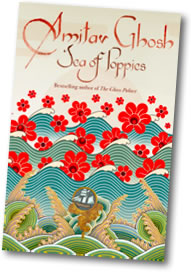I recently read this book as part of a reading challenge. The author wrote this book in a peculiar format. A side character from one chapter becomes the narrator in the next chapter and so on. By doing this, the author is able to use different narration techniques in the same book. It also helps us understand a situation from different points of view. She is a real wordsmith. She writes one chapter as a field guide to a spy and another through messages between the characters.
Bix, the founder of a successful social media company, is looking for new ideas to expand his company. As part of this, he attends a meeting at a college by a professor, Miranda Cline. Bix has used Miranda's original ideas about trust to build his social media company. In this meeting, he learns of a technology to transfer the consciousness of animals to the cloud. Bix takes this idea and creates a new product call Own your Consciousness. With this product you can transfer all your memories to the cloud. You can also change some recent traumatic memories and re-implant them back to your brain. Uploading your memories to the collective, gets you proportional access to others memories.
This is very enticing and most of the world starts uploading their memories. Most people use this for personal and societal needs - to catch who was the kid that beat me up? What happened to that guy I shared a beer with at the Cafe? Who killed my friend etc. Chris remarks that the problem is that it is so attractive that people will give it everything. And the collective is omniscient. It is a Candy House - giving away your memories has benefits, but it can lead to unintended consequences. In fairy tale Hansel & Gretel, the witch uses the Candy House to lure them into the house. She feeds Hansel in the hopes of eating them. This reminded me of the aphorism in silicon valley, if you are not paying for the product, you are the product.
Egan doesn't explore all the pros and cons of Own Your Unconscious. She tells us how the lives of different characters and how they live in the world with this tech. Charlene uses it to see her dad smoking pot at a commune when she was waiting for him to come home. Another daughter Roxy tries to relive a London trip with her father. Only it is leaves her with hurt. Later she uploads her memories and dies, finally feeling the connection with her dad. Alfred's character mocks the overperformance in social media. He hates it and takes to screaming in public to get an authentic response from people.
Not everyone is enthusiasitc about sharing all the memories with the collective. Chris leads the resistance to this collective by building an app called Mondrain. He helps people elude from the collective by using proxies. They use fiction writers work to mimic them using their memories from the collective.
Lincoln is a counter who helps identify the proxies and cut them. Lulu is a citizen spy with electronics called weevils embedded in her. Even after stint as a spy has ended, she faces trauma. She worries that the government is spying on her husband using the weevil implanted in her. There is Ames Hollander who runs an off the books store to remove weevils from former citizen spies. This helps them relax and not worry anymore about govt. spying.
Bix's youngest son, Gregory doesn't share his father's interest about Own your unconscious. His father has shown his uploaded memories to the family many times. Those memories start with a blank space where his dad doesn't have any ideas. That interests Gregory.
Later when he grows up, he comes to know that his father willed a lot of money to the Chris's resistance non-profit. He feels that he didn't know his Dad enough. One snowy day, he realizes that the blank vision his father started with was not blank. It was the human collective with each person doing different things. So it needed him to write his book to makes sense of all that.
This novel is a huge panomara with lots of characters. There is no overarching narrative to the novel, except exploration of the lives of people around this technology. That is how Egan makes her point - stressing the importance of fiction in making sense of the human stories.
“Only Gregory Bouton’s machine—this one, fiction—lets us roam with absolute freedom through the human collective. But knowing everything is too much like knowing nothing; without a story, it’s all just information. ”
And that's why you need a narrator to connect the information into a narrative.
These are the stories I liked the most -
- Lincoln's story where he uses maths to understand the elusive thing that can make M fall in love with him. It is a clever expression of a math obsessed kid who loves M but can't express it to her in a way she understands.
- The story of Lulu, Molly, Chris and Colin when they share a close moment together on a pier. The teenage friendship, love and awakening moments was touching.
- The story of Miles Hollanders' fall and redemption. Miles predicted that no one likes being right the first time. He then goes on to follow the script by falling from grace and then rising to be a state senator.
- The story written in messages about Lulu's interview plan with Jazz Attenborough. It was clever and shows projects take shape.


